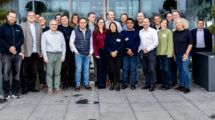Words: Salomé Branco, FCCN
The Recovery and Resilience Facility, based on the European Union’s #NextGenerationEU axis, is a unique opportunity for a structural transformation of its Member States. The Facility mobilises 723.8 billion euros to support reforms and initiatives integrated into their national Recovery and Resilience Plans (RRPs).
Portugal is no exception, and this lever has enabled innovation in three main areas: Resilience, Climate Transition, and Digital Transition, the latter through significant investments in the digitalization of companies, state, and government and the provision of digital skills in education, health, culture, etc.
As October is Digital Skills Month in Portugal, we must take this opportunity to understand how the RRP, namely through the Foundation for Science and Technology (FCT), has been boosting its third axis of action, in terms of Science. ‘Ciência + Digital’ is one of the programs allied to this support, which is being implemented by the FCT. With funding of 48 million euros, approved in 2023, 56% of which has already been implemented, this program aims to accelerate the digital transformation of the National Scientific and Technological System. It aims to promote greater competitiveness in the economy, society, public administration and the business community through five central projects.
Its first action is to create a Science and Technology Campus, open to society and geared toward the future, which, together with the Science Desk, will provide researchers with the main services and funding mechanisms.
In terms of Advanced Computing, the RRP is making it possible to create a National Advanced Computing Centre (CNCA) by reorganizing the country’s existing advanced computing centers and networks into a single entity. This pillar will support the operation of the Deucalion and MareNostrum 5 supercomputers.
By 2026, 94 funded projects in the fields of Artificial Intelligence, Cybersecurity, and Data Science are also expected to be finalized. The implementation of the National Programme for Open Science and Open Research Data (PNCADAI) is also one of the axes of this fund, providing a network of infrastructures, services, and tools to support open science and, in particular, the management of research data.
Finally, also concerning Digital Skills, the RRP provides for the availability of 50 new courses offered through the national platform for massive online courses (NAU), developed by the FCCN – digital services of the Foundation for Science and Technology. This action will make it possible to promote the training and digitalization of the Portuguese population, encouraging the acquisition of new skills free of charge and in a completely online format.
This investment will thus boost the digital skills of the Portuguese in the medium and long term, making the population better able to keep up with constant innovation. In addition to being more digital, the RRP will also promote a more innovative and digital science (and technology) that is open to all.








